
Islamic finance is no longer a regional curiosity; it is becoming part of the structural foundation of global financial systems. Once confined to a handful of markets and perceived as serving a niche clientele, Islamic banking was often seen as parallel to, rather than integrated with, the global financial mainstream. This shift reflects a growing recognition of its ethical foundations, structural resilience, and alignment with evolving global economic priorities.
Within the UAE, both Dubai and Abu Dhabi are increasingly recognised as critical global financial hubs. This has been driven in recent years by successful economic diversification underpinned by a fast-growing financial services sector and infrastructure aligned with international best practice. Islamic finance has an integral role to play in enabling cross-border market accessibility and diversifying domestic funding sources to support the next phase of financial services development in the UAE.
Standard Chartered’s latest report, Islamic Banking for Financial Institutions: Unlocking Growth Amidst Global Shifts, reveals that global Islamic finance assets are on track to surpass $7.5 trillion by 2028, up from $5.5 trillion in 2024. This represents an impressive 36 per cent asset growth over the next four years.
Rising financial volatility, growing calls for sustainability, and demand for inclusive, ethical finance have brought Islamic banking into sharper global focus. The UAE is at the forefront of this shift, publishing a set of Guiding Principles for sustainability in Islamic financial institutions in 2023 that encourage industry participants to integrate sustainability ambitions into their practices and processes. Recent progress has shown that these values are resonating more than ever with governments, corporates, and investors seeking resilient and inclusive financial frameworks in the UAE and across the MENA region.
Islamic banking now accounts for over 70 per cent of total Islamic finance assets and is set to grow from $4 trillion in 2024 to $5.2 trillion by 2028. Meanwhile, the Sukuk market, a vital liquidity tool for governments and institutions, is projected to reach nearly $1.5 trillion. The UAE was one of several countries to make short-term treasury sukuks available in recent years, as they are considered among the most effective tools for fund raising in Islamic money markets. The overall growth in Islamic finance assets highlights shifting preferences, deeper institutional integration, and rising global demand for sustainable finance.
This shift also reflects a broader change in mindset. Islamic finance is no longer seen as “alternative finance,” but as strategic finance, a model that can integrate into the portfolios of global asset managers and the frameworks of sovereign wealth funds. Since the pandemic, the emergence of Islamic digital banks in countries including the UAE has been testament to this.

Khurram Hilal, CEO, Group Islamic Banking, Standard Chartered
At Standard Chartered, we view this moment as a call to action. As the only international bank with a global Islamic banking franchise, Standard Chartered Saadiq, we are uniquely positioned to partner with financial institutions, corporates, and clients across more than 25 markets, from the UAE to the UK and Africa. From helping institutions meet liquidity requirements to supporting green Sukuk issuances, we are enabling the next chapter of growth in Islamic finance.
Yet, with opportunity comes responsibility. The next phase of growth in Islamic banking will depend on how well the industry addresses existing challenges. Regulatory harmonisation across jurisdictions, improved liquidity management mechanisms, and a renewed focus on product innovation are all essential.
The journey of Islamic banking reflects growing prominence in the UAE, the broader MENA region and across international markets. As the world becomes more focused on resilience, sustainability, and inclusive prosperity, Islamic finance offers a model that speaks to both values and performance. The work ahead lies in deepening collaboration, improving consistency across markets, and continuing to innovate in ways that serve real economic needs.
At Standard Chartered, we are committed to enabling that journey and see this as an opportunity and a responsibility to support our clients, strengthen communities, and help shape a more balanced and purpose-driven financial future for the UAE as an increasingly critical global financial hub serving international markets.
The writer is CEO, Group Islamic Banking, Standard Chartered